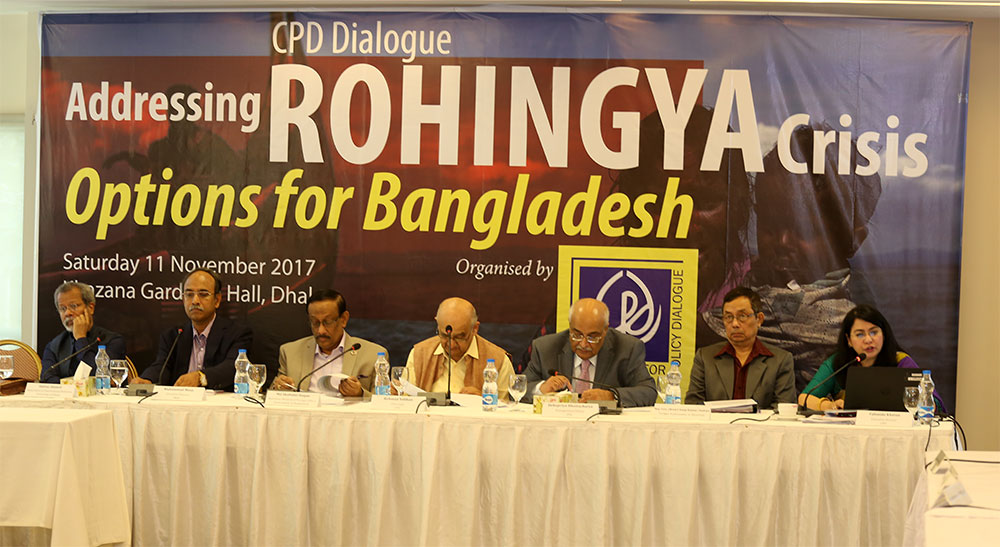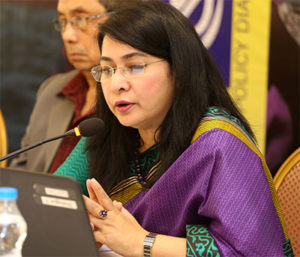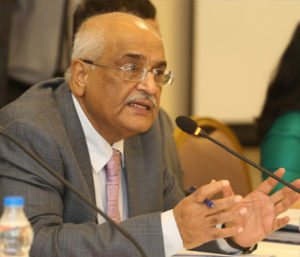
The origin and solution to the Rohingya crisis both lie with Myanmar. However, Bangladesh is facing a substantial challenge at this moment as the country is hosting around 1,008,431 Rohingyas. The country certainly needs improved national capacity to address the crisis. Besides, the authorities concerned should be ready to invest more not only to deal with the humanitarian and developmental aspects, but also to conduct research to gain further knowledge about Myanmar and the catastrophe to find out an acceptable solution to the long-standing crisis. These observations emerged from the dialogue on Addressing Rohingya Crisis: Options for Bangladesh organised by the Centre for Policy Dialogue (CPD) in Dhaka on 11 November 2017. The dialogue was organised in a move to provide a platform to have an open and in-depth exchange of views on the emergent situation.
Md Shahidul Haque, Secretary, Ministry of Foreign Affairs, Government of Bangladesh, attended the dialogue as the Chief Guest. Ambassador Major General (Retd.) Anup Kumar Chakma, former Ambassador to Myanmar; Dr Muhammad Musa, Executive Director, BRAC; and Professor Imtiaz Ahmed, Department of International Relations, University of Dhaka, were the Distinguished Panellists of the event. The dialogue was chaired and moderated by Professor Rehman Sobhan, Chairman, CPD and Dr Debapriya Bhattacharya, Distinguished Fellow, CPD respectively.
 CPD’s Executive Director Dr Fahmida Khatun made the keynote presentation. The presentation set the tone of the dialogue by providing an overview of the issues related to the crisis with particular focus on its economic implication. The estimated expenditure required per Rohingya for the period September 2017 to June 2018 is USD 735 or BDT 59,388, she highlighted.
CPD’s Executive Director Dr Fahmida Khatun made the keynote presentation. The presentation set the tone of the dialogue by providing an overview of the issues related to the crisis with particular focus on its economic implication. The estimated expenditure required per Rohingya for the period September 2017 to June 2018 is USD 735 or BDT 59,388, she highlighted.
The distinguished panellists and participants of the dialogue emphasised on two broad diplomatic approaches to address the Rohingya issue. Several discussants opined that the government should adopt aggressive diplomatic efforts towards Myanmar, while others suggested to adopt a soft approach to ensure safe and voluntary repatriation process of the Rohingyas. The authorities should initiate an international conference and invite the other countries, who are hosting Rohingya refugees, in a move to share experiences and come up with a more permanent solution to the crisis, several panellists recommended.
 Taking the discussion forward, the distinguished panellists and participants focused on the need to sort out the conceptual issues regarding the identification and definition of the Rogingyas. Bangladesh government should define the Rohingyas as ‘refugees’ as it would change the entire approach of handling the matter, they said. A number of participants emphasised on raising the issue to the International Court of Justice.
Taking the discussion forward, the distinguished panellists and participants focused on the need to sort out the conceptual issues regarding the identification and definition of the Rogingyas. Bangladesh government should define the Rohingyas as ‘refugees’ as it would change the entire approach of handling the matter, they said. A number of participants emphasised on raising the issue to the International Court of Justice.
Adding to the discussion, the speakers stressed on the need to carry out a comparative analysis of the Rohingya influx in 1978, 1992 and 2017. They also suggested to use Bay of Bengal Initiative for Multi-Sectoral Technical and Economic Cooperation (BIMSTEC), Bangladesh, China, India, Myanmar (BCIM) Forum for Regional Cooperation and other regional platforms to address the crisis. They emphasised to look at the issue from a historical perspective to try to come up with a more realistic solution.
On a different note, a number of discussants highlighted that the authorities concerned should be super sensitive in terms of the implication for Bangladesh’s indigenous people and Buddhist community while dealing with the Rohingya crisis, so that it does not destroy the country’s social harmony. The representatives of several international organisations and foreign envoys lauded the government’s role in this regard and pledged to continue their support.
In his remarks as Chief Guest, Md Shahidul Haque said that government is applying both aggressive and soft diplomatic approaches towards Myanmar for the safe and permanent repatriation of the Rohingyas. The government is very close to reaching a bilateral agreement with Myanmar regarding the repatriation process, he added.
The dialogue was attended by high-level government officials, academics, foreign diplomats, and INGO and NGO representatives. Major General Abul Hossain, Director General of Border Guard Bangladesh (BGB); Professor Sukomal Barua, Department of Pali and Buddhist Studies, University of Dhaka; Sanjeeb Drong, general secretary of Bangladesh Indigenous Peoples’ Forum; Ms Farah Kabir, Country Director, ActionAid Bangladesh; Brigadier General (retd) M Sakhawat Hossain, Ms Tayyaba Sharif, Senior Protection Officer, UNHCR; Ragnar Gudmundsson, Resident Representative, IMF; spoke among other distinguished participants at the event.

